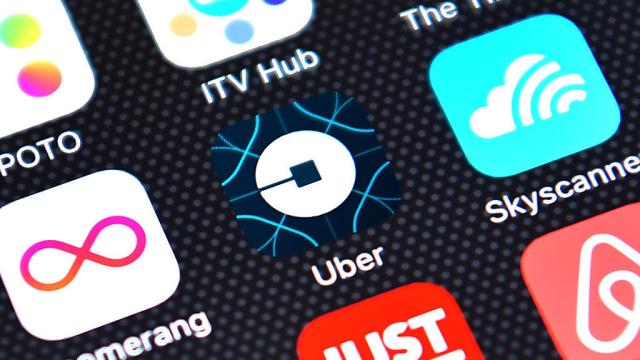Photo: Getty
Earlier this year, hundreds of companies began to publicly flee participation in the alt-right website Breitbart’s marketing network. One of those companies was Uber. But in a new lawsuit, Uber claims that its contracted advertising agency fraudulently continued to place ads on Breitbart, and the case seems poised to rock the seedy world of digital ads.
Since the election of Donald Trump, the wider public has come to understand that “alt-right” is a term for a group of people pushing the agenda of white nationalism. Considering the fact that Breitbart honcho Steve Bannon called his website “the platform for the alt-right,” many advertisers understandably didn’t want to be associated with it and by June the site reportedly had lost almost 90 per cent of its sponsors.
According to the lawsuit that Uber filed in a California court on Monday, the company instructed its mobile advertising agency Fetch to remove all of its promotions on Breitbart, but the ads continued to be displayed. In digital advertising, companies often rely on an agency to handle the distribution of ads, and a third-party is used to verify the agency’s transparency reports. In Uber’s case, it used a third-party called Tune. Uber claims that in transparency reports, one of the publishers that Fetch contracted reported ads placed on Breitbart as coming from other destinations with names like “Magic_Puzzles” and “Snooker_Champion.”
Uber subsequently ordered Fetch to cut off the publishers that it had identified as being responsible for the Breitbart ads, but Fetch apparently could not comply with the order. Then, when Uber fully cut ties with the network, its lawyers claim that it expected to see its number of app installs drop off. Instead, “there was no material drop in total installations. Rather the number of installations supposedly attributable to mobile advertising decreased significantly, while the number of organic installations rose by a nearly equal amount.”
The key thing to understand here is that Uber is relying on Fetch to report which ads directly led to an installation of its app following a user’s click, and it relies on Tune to go through the transparency reports. Uber is saying that the clicks that immediately led to a download were fraudulent and the reason for the subsequent download came from elsewhere. Techniques that were allegedly used to acquire this fraudulent data include auto-redirects, deceptive ad placement, ad stacking, click spamming, click injection, and fake reporting.
In a statement to Gizmodo, an Uber spokesperson wrote that “Fetch was running a wild west of online advertising fraud, allowing Uber ads on websites we wanted nothing to do with, and fraudulently claiming credit for app downloads that happened without a customer ever clicking on an ad.” It’s seeking to recover approximately $US40 ($50) million of the $US85 ($106) million it paid out to Fetch.
For its part, Fetch claims that this is all a strategy to distract from Uber’s non-payment for services to it and other smaller companies. A statement from Fetch’s CEO James Connelly was provided to Gizmodo that reads in part:
We are shocked by Uber’s allegations which are unsubstantiated, completely without merit, and purposefully inflammatory so as to draw attention away from Uber’s unprofessional behaviour and failure to pay suppliers. Fetch terminated its agreement with Uber months ago after Uber stopped paying invoices for services provided by over fifty small business suppliers, engaged by Fetch to place Uber’s mobile advertising. Following months of non payment, Uber eventually raised unsubstantiated claims relating to ad-fraud as a reason not to pay its invoices, but there is no basis to these claims …
We vigorously deny the allegations from Uber and will be responding robustly to ensure we set the record straight.
We asked Fetch specifically if it denies that it continued to run ads on Breitbart after Uber asked for them to be removed. A spokesperson told us that they would get back to us on that.
Uber’s lawsuit is pretty light on significant details regarding its fraud claims, outside of the alleged erroneous names that were attributed as a source of traffic instead of Breitbart, and its claim that ditching the ads didn’t really impact downloads. The suit seems to be throwing a lot of stuff at the wall and hoping that something will stick through the process of legal discovery.
That’s where things could go sideways for Fetch and the digital advertising world at large. According to Digiday, digital ad agencies are a $US48 ($60) billion business, and advertisers are starting to question if they are effective. Procter & Gamble chief brand officer Marc Pritchard recently called for a one-year deadline to see these agencies to get their act together and stop wasting “time and money on a crappy media supply chain.” Restoration Hardware CEO Gary Friedman gave a virtually identical statement last week.
A report from the Association of National Advertisers last year acted as a sort of tipping point when it claimed that digital ad agencies have enormous transparency issues. And the ad verification company Adloox estimates that companies will lose $US16.4 ($20) billion on fraudulent advertising in 2017.
More than just another example of Uber’s never-ending legal merry-go-round, this lawsuit could have a significant impact on the internet at large. The discovery process could reveal rampant malpractice on Fetch’s part, and prompt companies to flee the digital ad space. That would amount to less revenue generating the content you consume on the web. At the same time, embarrassing info about ad practices could fuel reforms that make the browsing experience better. All we know for sure is that Uber doesn’t have the greatest track record in court.
[Northern District of California via Ars Technica, Wall Street Journal]
